Key takeaways:
- Understanding composition fundamentals, including audience awareness and the importance of themes and tone, is crucial for effective writing.
- Regular practice and experimentation with different styles help unlock creativity and enhance writing skills.
- Seeking feedback and setting specific composition goals foster growth, improve clarity, and deepen the connection with the audience.
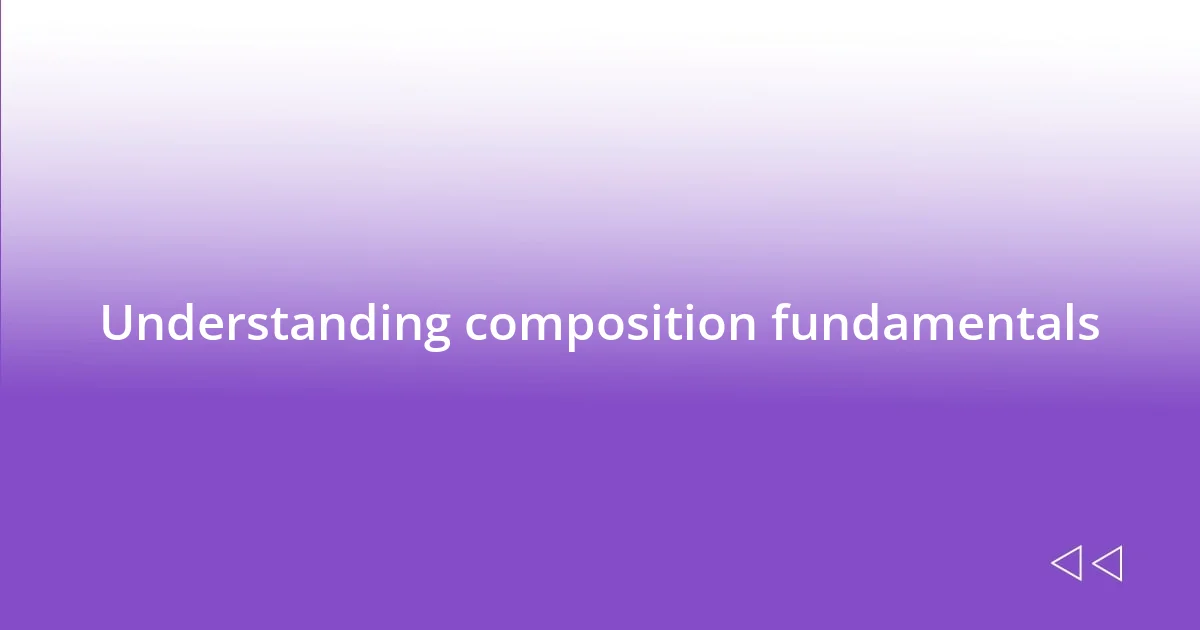
Understanding composition fundamentals
When I first delved into composition, I realized it’s much more than just putting words on a page; it’s a delicate dance of ideas and feelings. I often found myself grappling with structure, wondering why some pieces resonated while others fell flat. It’s crucial to understand elements like theme, tone, and narrative arc because they form the backbone of any compelling composition.
One thing I learned through trial and error is the significance of audience awareness. I remember writing a piece that enthralled me but left my classmates puzzled. I asked myself, “What was I missing?” It dawned on me that understanding who you’re writing for shapes how you communicate your ideas. It’s about connecting with others on a deeper level.
I can’t stress enough how vital practice is in honing your composition skills. Every time I sit down to write, I remind myself that each draft, no matter how rough, gets me one step closer to understanding my voice. Have you ever looked back at your earlier work and felt a mix of embarrassment and pride? That’s growth, and it’s an exciting part of the journey!
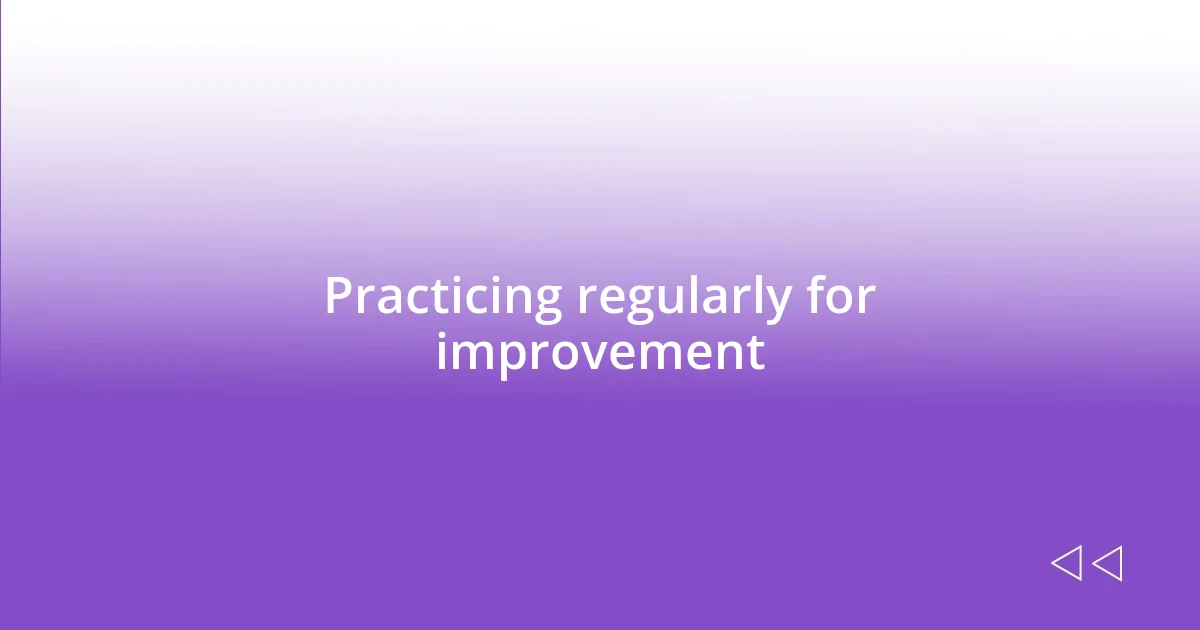
Practicing regularly for improvement
Practicing regularly is essential for anyone looking to enhance their composition skills. I vividly remember a phase when I committed to writing daily, and it transformed my approach. Each morning, I would sit with my coffee, the quiet stillness around me amplifying my thoughts. Those moments became sacred, where experimentation and creativity flowed freely, and even a few minutes could yield surprising insights. It’s fascinating how, through consistent practice, I began to uncover patterns in my writing that I hadn’t noticed before.
- Set aside dedicated time for writing each day, even if it’s just 15 minutes.
- Experiment with different styles and genres to expand your creative horizons.
- Reflect on what works and what doesn’t; keep a journal of your writing experiences.
- Share your drafts with others to gain valuable feedback that can guide your improvement.
- Don’t be afraid to revisit old pieces; they often hold the seeds of your growth.
By integrating these strategies, I’ve watched my skills blossom, moving from self-doubt to clarity and confidence as a writer. Regular practice has been the key, unlocking doors I didn’t even know existed.

Learning from great composers
Learning from great composers offers a unique opportunity to elevate your own composition skills. When I explore the works of legendary composers, like Beethoven or Mozart, I find myself transported into their creative processes. I remember dissecting a Beethoven symphony and being amazed at how he ingeniously manipulated themes. It was like seeing a master artist at work—each note carefully placed to evoke specific emotions. This deep dive into their compositions not only fuels my inspiration but also teaches me valuable lessons about structure and dynamics that I try to incorporate into my own writing.
While studying different styles, I noticed how each composer uses rhythm and phrasing to convey meaning. Tchaikovsky’s intense emotional landscapes have taught me the importance of contrasting dynamics. I often ask myself, “How can I create tension and release in my writing?” By experimenting with pacing, much like Tchaikovsky did with his scores, I’ve learned to engage readers on a more visceral level. It’s an exhilarating experience to think about how each pause or surge in my writing can mirror the emotional ebb and flow found in music.
Engaging with the philosophies of great composers also opens my eyes to the art of revision. Take Brahms, for instance; I’ve read about how he meticulously rewrote his work until it resonated perfectly. I empathize with that struggle. My own drafts often feel chaotic, and I sometimes wonder if I’ll ever reach a place where I’m satisfied. But reminding myself that perfection comes with relentless refinement—that’s a comforting thought. I find solace in knowing that even the masters faced similar hurdles, pushing me to embrace the beauty in reworking until the music of my words flows just right.
| Composer | Technique/Insight |
|---|---|
| Beethoven | Manipulating themes for emotional impact |
| Tchaikovsky | Using contrasting dynamics for tension and release |
| Brahms | Emphasizing the process of revision for perfection |
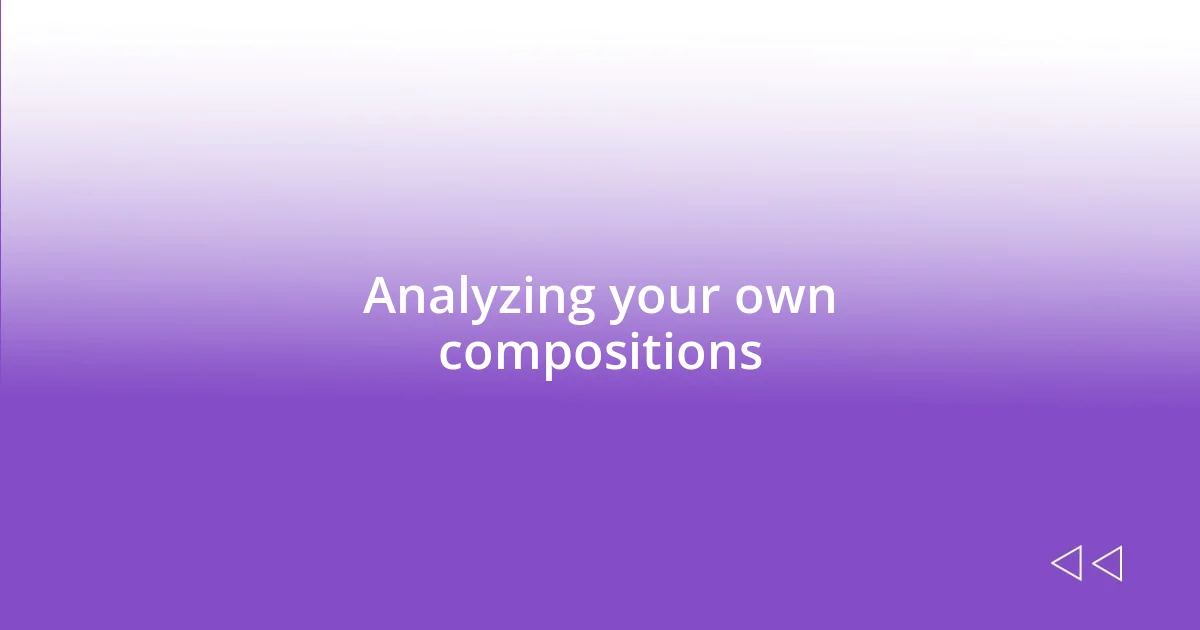
Analyzing your own compositions
I find that analyzing my own compositions is a crucial step in honing my writing skills. Often, I’ll take a piece that I felt particularly proud of, and return to it after some time has passed. It’s amazing how I can spot areas for improvement that were invisible during the initial excitement of drafting. I ask myself questions like, “What did I intend to convey, and did I achieve that?” This process not only helps me refine the piece but also deepens my understanding of my writing style.
When I dissect my compositions, I focus on both structure and emotion. There was this one story I wrote where I thought I had beautifully captured the protagonist’s struggle, yet upon review, I realized the climax lacked the intensity I aimed for. I felt a bit disappointed, but that emotion sparked curiosity in me. How could I elevate that tension? By identifying weak spots in my work, I can actively seek ways to enhance those moments, pushing myself beyond my comfort zone.
Furthermore, I’ve found that discussing my writings with others is an invaluable part of the analysis process. I once shared a draft with a friend who pointed out how the pacing felt uneven. At first, I felt defensive, but then I remembered that feedback is a gift. It made me realize that stepping back from my work, and viewing it through a different lens—like that of a reader—can illuminate things I might otherwise overlook. Now, I regularly ask for critiques, knowing it ultimately serves my growth as a composer of words.
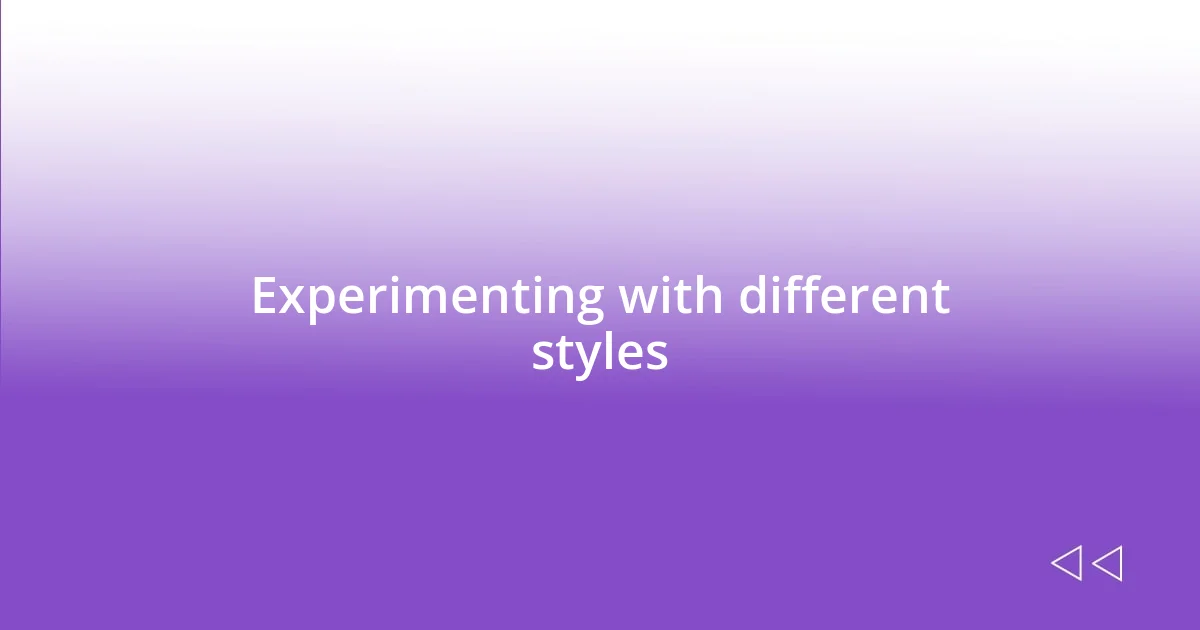
Experimenting with different styles
Experimenting with different styles has been one of the most liberating aspects of my composition journey. I remember when I decided to try my hand at writing in a stream-of-consciousness style. At first, it felt chaotic, like a whirlwind of thoughts spilling onto the page. But as I embraced the messiness, I discovered an unexpected freedom in articulate raw emotion. It taught me that allowing my thoughts to flow without stringent structure could spark creativity in ways I never anticipated.
A pivotal moment for me occurred while I was experimenting with contrasting styles—poetry versus prose. I took a poem filled with rich imagery and tried reworking it into a short story. The challenge was daunting, but I soon found a rhythm that allowed me to retain the emotional depth while expanding on narrative elements. The experience raised an important question in my mind: “How can different forms illuminate various facets of my writing?” By seeking answers through experimentation, I’ve unearthed new layers within my voice, and it’s invigorating.
Even after finding some success in blending styles, I often find myself yearning for more experimentation. Recently, I explored writing from a first-person and then a third-person perspective within the same narrative. While it was confusing at times, it also revealed insights about character depth and point of view. I couldn’t help but wonder, “What if shifting perspectives can transform how readers connect with my characters?” These kinds of explorations remind me that composition is a perpetual journey, one where each new style could potentially unlock yet another avenue for expression.

Seeking feedback from others
I’ve discovered that seeking feedback from others is an essential part of my improvement process. Recently, I shared my latest short story with a writing group I belong to, and their insights were eye-opening. One member pointed out that I had a character who felt one-dimensional, which was hard to hear at first. But after reflecting, I realized how crucial it is for every character to resonate with depth and authenticity. That realization unlocked a desire in me to create more layered characters in future pieces.
Feedback can be a mixed bag of emotions, can’t it? I remember a time when a mentor read my work and highlighted several areas where I had gone astray in tone. At first, I felt overwhelmed, thinking, “Did I completely miss the mark?” However, I learned to view each piece of feedback as a stepping stone rather than a setback. Embracing constructive criticism not only challenged my ego but also illuminated paths to elevate my writing.
What has struck me the most is how collaborative feedback can fuel creativity. Just last week, a friend suggested I swap narrative perspectives in my story, making it a dialogue instead of a monologue. At first, I was skeptical—what if it ruined the essence of what I wanted to say? But, I took the plunge and rewrote the piece. The difference was striking! It made me ponder, “How can validating others’ perspectives lead to unveiling new dimensions in my own work?” This journey has shown me that feedback isn’t just about critique; it’s about embracing new ideas and growing together as writers.
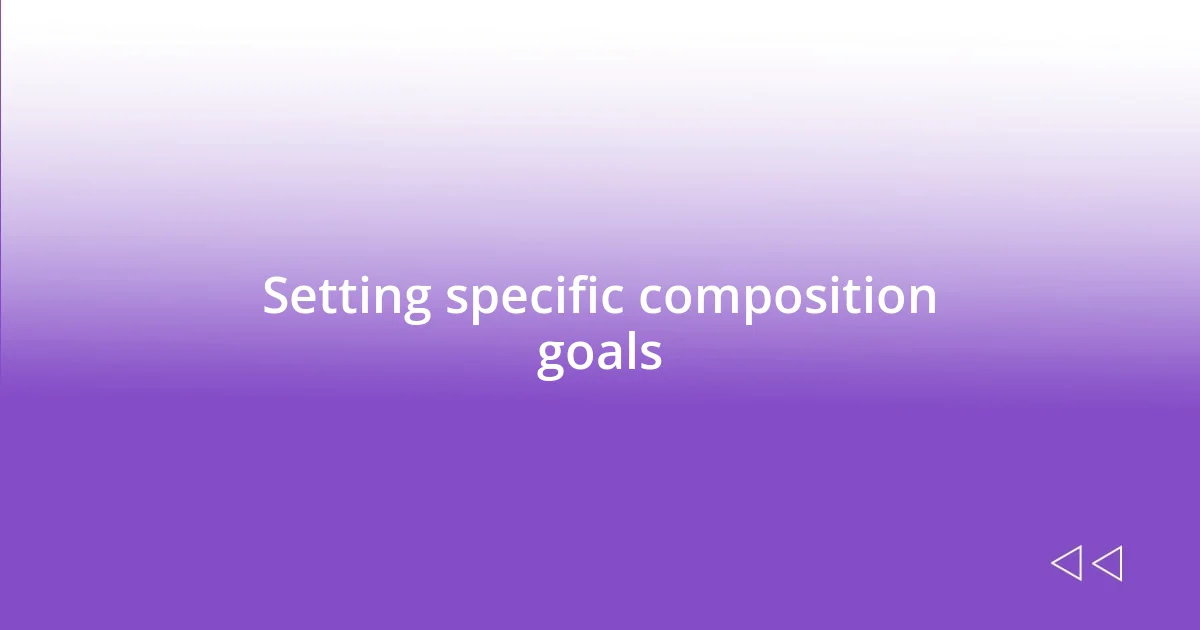
Setting specific composition goals
Setting specific composition goals has transformed my writing practice. For instance, after realizing I often rushed through my drafts, I set a goal to spend at least thirty minutes each day on a single paragraph. I found myself diving deeper into my thoughts, which allowed me to better articulate my ideas. I even asked myself, “What if I focused entirely on crafting one vivid image?” That question guided me into a more deliberate and imaginative writing space.
I remember the excitement of creating a checklist for my writing goals. One item was to incorporate at least three literary devices in every short story I wrote. Initially daunting, it gradually became a game that enriched my creativity. I experienced firsthand how setting specific, measurable targets could ignite my passion for details and nuance in writing. It made me reflect: “How does focusing on the smaller aspects enhance the overall story?”
Setting deadlines for my writing projects has been another pivotal strategy. A while back, I committed to submitting a piece to a local magazine by a specific date. The pressure was invigorating! I discovered that the act of visualizing my submission countdown helped me prioritize my writing time. I began to wonder, “Could the urgency of deadlines breathe new life into my creativity?” Indeed, it did. Each goal, each deadline has reshaped how I relate to my craft and, ultimately, to myself as a writer.












